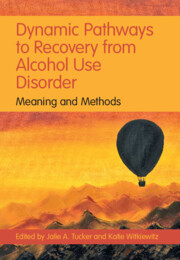Book contents
- Dynamic Pathways to Recovery from Alcohol Use Disorder
- Dynamic Pathways to Recovery from Alcohol Use Disorder
- Copyright page
- Dedication
- Contents
- Figures
- Tables
- Contributors
- Foreword
- Preface
- Acknowledgments
- Introduction
- Part I Micro Level
- Part II Meso Level
- Part III Macro Level
- 16 Recovery Communities
- 17 Disparities in Alcohol Treatment Access in Rural Areas
- 18 Recovery, Communities, and the Organized Recovery Movement
- 19 Alcohol Control Policy and Regulations to Promote Recovery from Alcohol Use Disorder
- 20 Causal Inference Approaches to Studying Recovery from Alcohol Use Disorder
- 21 Building on Collaborative Research to Co-Design SURE Recovery, a Mobile Application for People with Experience of Alcohol and Other Drug Problems
- 22 Economic Methods Used to Evaluate Recovery Programs for Alcohol Use Disorder
- Conclusions and Future Directions
- Index
- References
22 - Economic Methods Used to Evaluate Recovery Programs for Alcohol Use Disorder
from Part III - Macro Level
Published online by Cambridge University Press: 23 December 2021
- Dynamic Pathways to Recovery from Alcohol Use Disorder
- Dynamic Pathways to Recovery from Alcohol Use Disorder
- Copyright page
- Dedication
- Contents
- Figures
- Tables
- Contributors
- Foreword
- Preface
- Acknowledgments
- Introduction
- Part I Micro Level
- Part II Meso Level
- Part III Macro Level
- 16 Recovery Communities
- 17 Disparities in Alcohol Treatment Access in Rural Areas
- 18 Recovery, Communities, and the Organized Recovery Movement
- 19 Alcohol Control Policy and Regulations to Promote Recovery from Alcohol Use Disorder
- 20 Causal Inference Approaches to Studying Recovery from Alcohol Use Disorder
- 21 Building on Collaborative Research to Co-Design SURE Recovery, a Mobile Application for People with Experience of Alcohol and Other Drug Problems
- 22 Economic Methods Used to Evaluate Recovery Programs for Alcohol Use Disorder
- Conclusions and Future Directions
- Index
- References
Summary
The economic costs associated with alcohol consumption are tremendous both in terms of negative health effects and negative societal outcomes. While there are many policies and treatment programs that can reduce these costs, determining which recovery programs are the most effective use of societal dollars is a complex task. This chapter summarizes the economic burden associated with alcohol use disorder (AUD) and explains why an economic perspective is important in understanding AUD recovery. The three most common types of analysis used to evaluate AUD interventions to promote recovery are reviewed: cost, cost-effective and benefit-cost analysis. The types of data typically used for economic analysis and when each type of analysis is appropriate are described. Also discussed are the general methods for each type of analysis, underlying modeling assumptions, and how economic analysis can be conducted from different perspectives.
Keywords
- Type
- Chapter
- Information
- Dynamic Pathways to Recovery from Alcohol Use DisorderMeaning and Methods, pp. 400 - 412Publisher: Cambridge University PressPrint publication year: 2022

